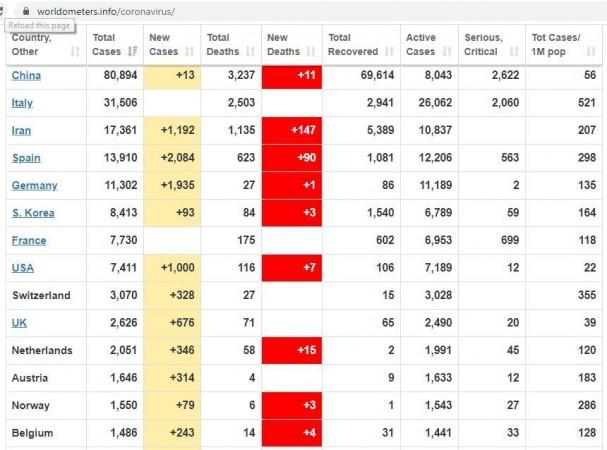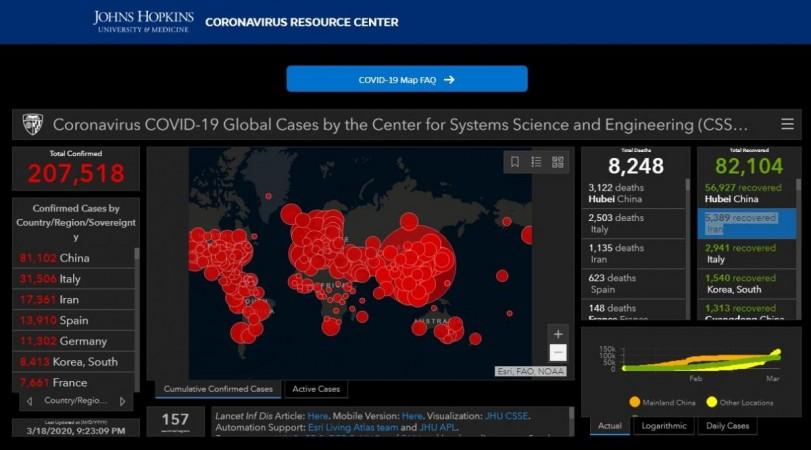The virus that starts with mild symptoms of fever and cold for most people slowly exacerbates in the case of the elderly and those with existing health conditions to finally result in being tested positive for coronavirus.
Recorded numbers of the coronavirus affected globally
China is the worst hit by the virus with 81,102 cases so far, Italy and Iran being the second-worst hit with 31,506 and 17,361 cases reported. Of the 8,243 deaths globally caused by the virus - 3,122 deaths were in Hubei, China alone, followed by Italy and Iran registering 2,503 and 1,135 deaths in the country. Spain recorded 623 deaths, and 148 deaths were recorded in France.
In addi, 56,927 people have recovered from Coronavirus in Hubei, China alone. Minimal recovery was seen in second-worst affected nations of Italy and Iran with 5,389 and 2,941 patients cured.
Coronavirus is prevalent in every state in the US and the Trump administration has thus invoked the Defense Production Act to increase supplies of vital equipment for beefing up healthcare facilities in the country. By invoking the Defense Production Act of 1950, the president of the United States has taken extraordinary action to ramp up production of critical equipment and supplies such as respirators, ventilators and protective equipment for health care workers.
The Trump government is further allowing for "immediate relief to renters and homeowners" by suspending all foreclosures and evictions until the end of April while requesting $500 billion for direct payments to American taxpayers as part of a $1 trillion plan. According to a Treasury Department proposal, another $300 billion has been allocated to help small businesses meet their payroll requirements and survive the crisis.
Global lockdown of borders
Besides limiting people's movement and exerting travel curbs, the European Union has shut down borders for "non-essential traffic". The frontiers open only for cross-border workers and for trucks carrying critical daily goods such as food and medicine. Hungary opened its borders overnight, in phases for some traffic to pass by. Citizens of Bulgaria were first allowed to cross borders in carefully controlled convoys, followed by Romanians. Also, the borders between the US and Canada, and the causeway that connects Malaysia and Singapore was locked down.

With more than 300,000 people commuting between Malaysia and Singapore every single day, Malaysia only imposed a lockdown when the region saw a spike in coronavirus cases to 790, to make it the worst-affected region in Southeast Asia. Meanwhile, the Philippines gave foreigners 72 hours to leave from the main part of its island. In India, the number of Covid-19 cases is on an increase with 14 fresh cases reported from Ladakh, Chennai, Telangana, Bengaluru and Uttar Pradesh to total 151 as of today.
Nepal will soon close its borders disallowing entry of all foreign entrants and also prohibit entry of its own people with effect from Friday midnight until April 15, according to the Kathmandu Post. However, the movement to and from China will continue to remain open.
Sri Lanka is closing all airports for arriving passenger flights until March 25, however, departures, passenger connections, and transits to other flights will be permitted. In light of the coronavirus outbreak, Germany has suspended resettlement programs for refugees. With 238 confirmed cases of coronavirus but no deaths in Chile, the president of Chile Sebastian Piñera has declared a 90-day emergency to curb the spread of coronavirus in the country.
Nigeria has issued a travel ban on citizens from 13 coronavirus affected countries namely - Italy, China, Iran, Spain, South Korea, France, Japan, Norway, Germany, the United Kingdom, the US, Switzerland, and the Netherlands. The governor of Hawaii has asked travelers to postpone their island vacations for the next 30 days. Brussels has taken a "unanimous and united approach" to prohibit foreigners from entering the region for the next one month.
Impact of Covid-19 on the economy in the near future
With global markets experiencing an economic slowdown, the Wall Street and White House foresee an increasing risk of a recession due to the pandemic, while the United Nations forecasts an increase in unemployment levels globally to affect nearly 25 million people in the near future.

As per the current order, schools in India will remain closed until March 31. Deputy Chief Minister Manish Sisodia said in an official order, "As per the current plan, schools are likely to reopen on April 1 and resume normal teaching and learning in new academic sessions, if the situation becomes normal. However, in case we need to close schools further, we need to have an alternate plan so that the academic loss of students can be minimized."
The Directorate of Education (DoE) has called upon a meeting on March 26 with teachers, officials and private school principals to discuss the further plan of action, in case the coronavirus outbreak persists and continues to increase until then.
As the positive coronavirus tested cases in Maharashtra increase to 19 in Pune and 44 in the region, the Maharashtra government has decided to keep the government offices working with 50 percent minimum attendance, to reduce the passenger load on public transport services that include suburban trains and enforce social distancing guidelines.
As per directions issued by the Maharashtra Chief Minister Uddhav Thackeray, half of the Maharashtra government staff will work in rotational shifts and some might come to work on alternate days, as the need of the hour is to "control crowding" of places.
The Directorate of Health Services said, a total of 17 people have been tested positive for coronavirus in Uttar Pradesh – 8 are from Agra, 2 from Ghaziabad, 4 from Noida and 3 from Lucknow. In Jammu and Kashmir, the Magistrate bans the entry of devotees to the places of worship with immediate effect till March 31. The order says, "Religious leaders may, however, continue to follow the norms of prayers."









!['Had denied Housefull franchise as they wanted me to wear a bikini': Tia Bajpai on turning down bold scripts [Exclusive]](https://data1.ibtimes.co.in/en/full/806605/had-denied-housefull-franchise-they-wanted-me-wear-bikini-tia-bajpai-turning-down-bold.png?w=220&h=138)



